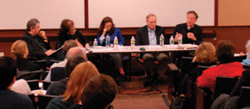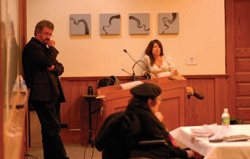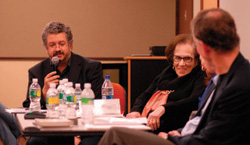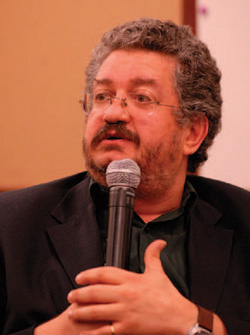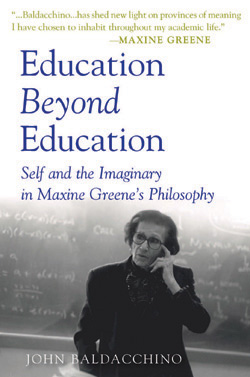Writing the Book on the Radical Philosophies of Maxine Greene
Professor John Baldacchino discusses the 'radical philosophies' of a legendary TC scholar
There is an epigraph in the last chapter of John Baldacchino’s new book, Education Beyond Education: Self and the Imaginary in Maxine Greene ’s Philosophy (Peter Lang, 2009), in which the eminent philosopher and TC Professor Emeritus of Philosophy and Education, herself declares, “We are interested in education here, not schooling.” And so, it might be said, is the book in which Baldacchino, Associate Professor of Art Education, plumbs the depths of the ideas that Greene has honed during her 35 years on the TC faculty. Two parts academic treatise, one part armchair rumination, the book opens the schoolhouse door to the far-flung reaches of democracy and imagination, where Greene stakes many of her most enduring insights. Intrigued by the novelty of a TC professor writing a book about another, Inside sat down with Baldacchino to discuss the “radical” ideas of one of the twentieth century’s most important philosophers of education.
You wrote the manuscript in six months. That’s quite a feat given the sometimes glacial pace of academic writing.
It’s interesting: I read slowly but write very quickly. I had wanted to write a book about Maxine and talked to Teachers College Press for a while, but it didn’t really happen. Then a colleague told me that there was a very good series at Peter Lang and that I should write to them. I did and within a week I had a contract, and they said they wanted the manuscript by September. So I put everything aside and wrote it.
The book isn’t a biography of
The way Maxine approaches other philosophers like Hannah Arendt or Jean-Paul Sartre—not to mention John Dewey—is to engage with their ideas but also bring in her own voice, her own ideas and agenda. So I thought, why don’t I do the same thing? I just used her method to engage with her ideas.
What do you find most essential in Greene’s philosophy?
The possible. We are what we are. We have our limits. We have our tragedies. We have our happiness. Yet, on the other hand, we can’t just sit there. We have to take up our possibilities. Our possibilities are what make us human. That we can think of the possible means we can think beyond our current condition. That is a beautiful thing when you think about it. The possible is so strong in her work. It becomes political. Democracy is a possibility to her. The possible brings everything together in her work. For me, that’s what I take from Maxine: The power of the possible. So if you went to school but can’t see your possibilities, then you don’t have an education.
Do you consider Greene a radical?
Yes, I do. I would call her a radical democrat. She looks at democracy in a very radical way. She is radical because she goes to the root problems of injustice and oppression, and she says you can’t just look at those issues from the outside; you have to engage them—really take them on and tear them apart. I know sometimes people call terrorists radical, but there is a whole tradition of radical philosophy standing on the side of progress and emancipation. As I read her work, she is saying that we can’t just assume education is good for us. We need to question education in order to make sure it is good for us.
It’s interesting that John Dewey doesn’t show up much in your analysis of Greene’s work.
It’s easy to just say that Maxine Greene is an American and is a philosopher of education, therefore she is a Deweyan. That’s been done. I didn’t want to do that. I came at it from another position and wanted to show that there were other influences on Maxine’s work, such as that of continental philosophy.
Still, that a school of education produced John Dewey in the fist part of the twentieth century and
Yes, well, TC is a great place for this kind of stuff, and I hope we can sustain it. I hope we don’t allow the reification of education to throw out that great legacy.
To view the February 26 discussion about John Baldacchino’s book, visit www.tc.columbia.edu/news/6904.
To view the 2009 Radical Philosophies and Education Seminar lecture by Maxine Greene on March 3, visit www.tc.columbia.edu/news/6905
Published Tuesday, Mar. 24, 2009
